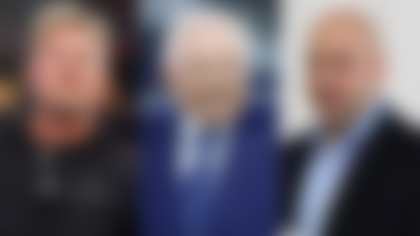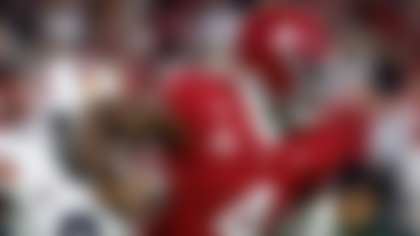The events of this week did provide us all one more answer about the future of the NFL in Los Angeles.
Simply, it doesn't involve the Vikings.
As for the rest of it, the league is no closer to returning to the nation's second-largest market. And the truth is, there's a good chance the NFL is still a long way from returning to a city it vacated -- twice over -- 17 years ago.
Where's the smart money on when the league will put a club there?
The L.A. stadium efforts are where they've been.
Ed Roski and Majestic Realty's project in City of Industry, 20 miles east of Los Angeles, continues to be touted by his group as "shovel-ready," with the land and ability to host the gameday experience that the league wants. Majestic vice president John Semcken went so far Thursday as to say, "The project is ready to go, we just need a team." Trouble is, the project's location is viewed by some as far from ideal.
Meanwhile, the downtown project orchestrated by Tim Leiweke and AEG is still awaiting environmental approval. But it has more long-term issues, such as limitations in creating the pregame and postgame football atmosphere, and entanglements in AEG's desire to own whatever club lands there.
Glitzy as the downtown site is, there's a fair amount of support for the Roski project, according to club officials with knowledge of the situation. Though the possibility of Chavez Ravine, with the Los Angeles Dodgers now having been sold, is hovering, too.
So that's far from settled. And then there's the little matter of the league's perceived real motivation to get to Los Angeles, which is lower now than it has been in a while. A carrot for the NFL to re-inhabit the market was to squeeze more money out of the TV networks. But those deals were extended in December to go through the 2022 season -- meaning they'll expire in 11 years.
The league actually has found L.A. to be a profitable market from a TV standpoint if it's simply fed the best games week to week, which happens because there isn't a local club to stop that from happening.
That means the NFL can pick its spot. And with the league hell-bent on getting it right the next time in L.A., the ability to be patient is considered key. As one NFC executive said, "The league will wait until they get L.A. perfect -- perfect team, perfect owner, perfect location, perfect situation."
Given this catbird seat for the league, other factors will have to push the matter. First, one stadium site or another will have to emerge as the clear-cut answer to the "Where?" question that prevented L.A. from getting the expansion franchise that went to Houston in 2002. Second, a team will need to be motivated to go, with a large relocation fee likely. Third, the league will have to be satisfied that the team that goes to L.A. is the right one.
"There needs to be a certainty of success there from the league's standpoint, because this is gonna be their last chance at L.A. for decades," Ganis said. "They're not gonna shoehorn a deal in there."
Here's a quick breakdown of where things stand for each franchise ...
San Diego has a three-month escape clause at the beginning of each calendar year at this point in its lease, and could leave next year by paying just $22 million in outstanding bonds. Still, there's a feeling that the Spanos family doesn't want to leave, the NFL doesn't want to lose the San Diego market and a reasonable stadium deal will keep the Bolts there.
La Canfora: Best free agents left
Jason La Canfora points out the best players left on the open market, including Plaxico Burress and Albert
Haynesworth. **More ...**
They have the easiest out, and the shortest, most painless path, but they've already had the chance to go, and haven't. And they might not be the NFL's ideal answer to the L.A. question. Plus, there's the fact that -- and this effects the Raiders, too -- the California government won't be overly enthusiastic to help a stadium plan if it's simply robbing Peter to pay Paul.
The team has submitted a proposal to renovate the Edward Jones Dome to the St. Louis Convention and Visitors Commission. If it's accepted, the team's lease extends through 2025. If it's rejected, an arbitrator will work out a compromise plan, and the city accepting that one in December would also extend the lease to '25. If the city turns that one down, an out could be enacted in the Rams' lease in January 2015, pending some litigation.
What we know is owner Stan Kroenke has deep pockets and Los Angeles ties. The ball, for now, is in St. Louis' court to get the dome into the lease-prescribed "top 25 percent" of venues in the league.
The Raiders' lease is up after 2013. Sharing the 49ers' Santa Clara digs, set to open in 2014, is an option. A better one for the team would be gutting the Coliseum, which is located on a plot of land in Oakland the team feels is ideal. But the central question with the latter plan -- and really the former one, too -- is whether or not the Bay Area can support two teams, from a corporate standpoint, from a suite-selling standpoint, and -- if they were to play in separate venues long term -- from a naming-rights standpoint.
While some speculation exists that estate taxes will eventually force Mark Davis to sell the team, my understanding is that a plan is in place for the club to remain in the family. But that doesn't mean the family won't eventually see greener pastures in its old area code if its current region simply doesn't have room for two clubs to thrive financially.
The bottom line here is that Jacksonville simply hasn't grown the way the NFL envisioned when it awarded the city a franchise in 1995. But the club has been creative in trying to make its challenging conditions work. And with new ownership, the Jags probably aren't going anywhere for a while. One reason is the team's lease, which runs through 2030.
There is an out, but a tough one to enact. The Jaguars would have to prove they lost money three years in a row -- not an easy feat now, and one that might be tougher when the new TV deals kick in -- and then pay a significant fee on top of that. Also, Wayne Weaver put additional penalties for moving the team into his deal to sell the club to Shahid Khan, making it even more costly to do so. For now, Khan seems committed to making it work in Jacksonville. And really, for the time being, he doesn't have a choice.
Debate: Most impactful rookie
Which rookie will make the biggest impact on his team in 2012? Could it be Cleveland RB Trent Richardson? Our analysts debate. **More ...**
Owner Ralph Wilson, who is in his 90s, has said the team will not be moved while he's still living. The club's succession plan is to put the team in a trust and sell to the highest bidder. Still, the club is negotiating a new lease and renovation plan, and its regionalization efforts have been largely successful. Thirty-two percent of the club's tickets sales have come from Rochester, an hour away, and Southern Ontario, and the league is interested in continuing to cultivate the Toronto market.
Down the line, could a new deep-pocketed owner swoop in, and whisk the team away? It's not impossible. But chances are, that won't happen any time soon.
The bottom line is the NFL is thriving. The TV deals are done. And those in Los Angeles that follow the NFL have displayed a contentment with being fed the premier games on a week-to-week basis, even if it means that the closest team is located more than 100 miles away.
Maybe that changes sometime in the near future. But as of right now, there doesn't seem to be any real urgency to make that happen.
Follow Albert Breer on Twitter @AlbertBreer











